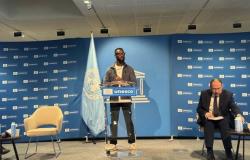Algerian President Abdelmadjid Tebboune signed the finance law for the year 2025 on Sunday, November 24, marking the entry into force of a bloated budget without precedent in the history of the country. Algeria’s accounts for 2025, unanimously approved by both houses of Parliament, show a historic deficit which dominated the debates.
The financial text provides for expenditure on a scale never before reached in the country, with a total of 16.7 trillion dinars ($128 billion), an increase of 10% compared to the previous year. However, this budget, which remains largely fueled by oil and gas revenues, shows a deficit of 8,271 billion dinars ($62 billion), representing 19.8% of gross domestic product (GDP). This figure marks a clear increase compared to the deficit of 43 billion dinars in 2024, and thus deepens the excessive dependence of the Algerian economy on hydrocarbon revenues.
Uncertain revenue forecasts and modest growth
The finance law forecasts revenues of 8,523 billion dinars ($64 billion), up 4.5% from the current year, thanks to a slight increase in oil and gas exports. However, this slight increase is not enough to compensate for the scale of public spending, in particular because of the increase in the deficit.
The Algerian government based its forecasts on a reference price of $70 per barrel of oil for the next three years, a threshold considered prudent, but which remains vulnerable to fluctuations in the world market.
An economy dependent on hydrocarbons
Algeria continues to suffer from its excessive dependence on oil and gas revenues, which represent around 90% of its foreign exchange earnings. This situation of dependence, combined with high public spending, fuels a chronic budget deficit, endangering the economic stability of the country.
The government forecasts economic growth of 4.5% in 2025 and 2026, before slowing to 3.7% in 2027. This estimate is attributed to an expected drop in growth in the hydrocarbon sector, a key sector of the Algerian economy. .





